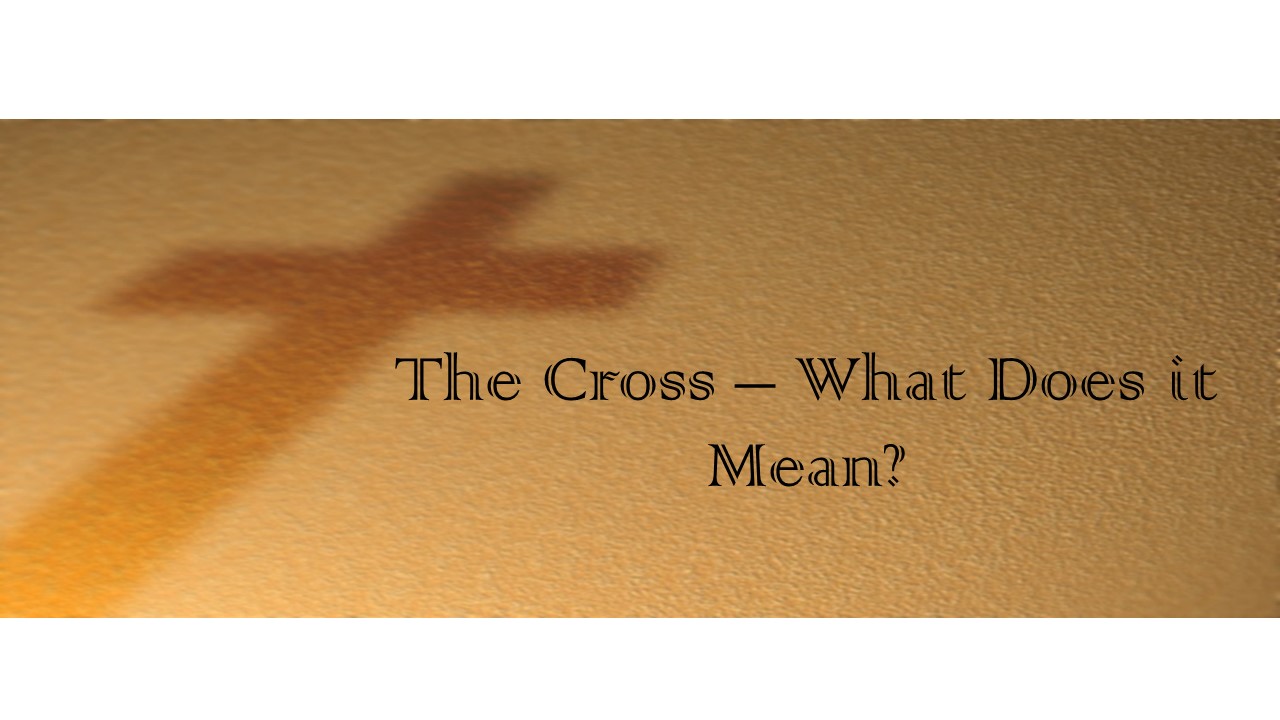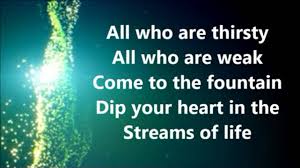Notes on the Notes – March 19, 2017

Lent 3
New Life
This week’s scripture:
Exodus 17:1-7 – Water from the rock
Psalm 95 – A song of praise
John 4:5-42 – Jesus and the Samaritan woman
This week’s music:
“All Who are Thirsty” (MV #4)
“All who are thirsty
All who are weak
Come to the fountain
Dip your heart in the streams of life
Let the pain and the sorrow
Be washed away
In the waves of his mercy
As deep cries out to deep, we sing
Come Lord Jesus, come
Come Lord Jesus, come
Come Lord Jesus, come
Come Lord Jesus, come”
This song was written by Brenton Brown in 1998. Brenton Brown, born in South Africa, is a Christian songwriter and worship leader. He was part of Vineyard music (UK), and during this time Brenton was the worship pastor at Oxford Vineyard, UK, and the coordinator of the Vineyard (UK) Worship Development Team.
In John 7:37b-39, Jesus said, “‘If anyone is thirsty, let him come to me and drink. Whoever believes in me, as the Scripture has said, streams of living water will flow from within him.’
Are we thirsty? Humans inherently feel that there is something more to life than just living and dying, or gaining reputation and amassing great wealth. There is a deep hunger and thirst for some spiritual meaning in our lives. Jesus satisfies us. Through the lyrics of this song, all who are “thirsty” are invited to come, and He will give us the Holy Spirit to lead and guide, and pour forth great joy and life, in and through our lives.
“Come and Journey” (v 1), Cath 476 (tune VU #675)
“Come and journey, with a Savior who has called us from our birth,
Who has washed us in the waters, and who loved us on the earth.
Come and journey, come and journey, with a Savior who has come.
We are all God’s sons and daughters. In the Spirit we are one.”
This week we will be singing the first verse of the hymn “Come and Journey” as our Lenten response. The words remind us that Jesus is with us, not only on our Lenten journey, but always. We will be using the tune ALL THE WAY, commonly known as the tune for the hymn “All the Way My Saviour Leads Me.”
“Healing River of the Spirit” (tune – VU #374)
“Healing river of the Spirit, bathe the wounds that living brings.
Plunge our pain, our sin, our sadness deep beneath your sacred springs.
Weary from the restless searching that has lured us from your side,
We discover in your presence peace the world cannot provide.
Wellspring of the healing Spirit stream that flows to bring release,
As we gain our selves, our senses, may our lives reflect your peace.
Grateful for the flood that heals us, may your church enact your grace
As we meet both friend and stranger may we see our Saviour’s face.
Living stream that heals the nations, make us channels of your power.
All the world is torn by conflict; wars are raging at this hour.
Saving Spirit, move among us, guide our winding human course,
Till we find our way together, flowing homeward to our Source.”
The words for this hymn were written by Ruth Duck and appear in her collection, Circles of Care. She says, “I wrote Healing river of the Spirit on a Sunday in August 1994, on the Isle of Iona in the Hebrides on the west coast of Scotland. Iona Community founder George MacLeod said that the veil between worlds is thin on that island; certainly Iona has been a center for Christian spirituality for many centuries. My visit there with my partner, John Stoppels, was a healing time for me. One of the emphases of the Iona Community is on healing ministries. Therefore, it seemed fitting to write a hymn about healing during some quiet time that day. ” (Source: Circles of Care). The words are set to the familiar melody BEACH SPRING.
“The Creed”
“We are not alone, we live in God’s world.
We believe in God, who has created and is creating,
Who has come in Jesus, the Word made flesh, to reconcile and make new,
Who works in us and others by the Spirit. We trust in God.
We are called to be the church;
To celebrate God’s presence,
To live in respect in Creation,
To love and serve others,
To seek justice and resist evil,
To proclaim Jesus, crucified and risen,
Our judge and our hope.
In life, in death, in life beyond death,
God is with us,
We are not alone,
Thanks be to God.”
“By the Well, a Thirsty Woman” (MV #117)
“By the well, a thirsty woman found the life that you could give,
We, too, thirst like empty vessels – fill us full that we may live.
Jesus, source of living water, Wellspring bubbling deep within,
By the waters of our baptism wisdom purpose life begin.
Plant us firm, like trees by water, send our roots down deep in you,
Quench our parched and thirsty spirits with your water, pure and true.
Jesus, source of living water, Nourisher of all on earth,
By the waters of our baptism quicken growth and give new birth.
May we be your streams of justice, as the water, may we move
Through your people – by your Spirit showing mercy, sharing love.
Jesus, source of livng water, Groundswell forcing truth to view,
By the waters of our baptism set us free to live for you.”
This words for this hymn were written in 1998 by Elizabeth Stillbom and then revised in 2005. Diana Wilcox wrote the music in 2006. The words reference this week’s gospel reading – the meeting of Jesus and the Samaritan women at the well, as well as making a connection to new life in Christ through baptism.
“Come, Worship God – Psalm 95” (VU #815)
“Come, worship God who is worthy of honour,
Enter God’s presence with thanks and a song!
You are the rock of your people’s salvation,
Go whom our jubilant praises belong.
Ruled bay your might are the heights of the mountains,
Held in your hands are the depths of the earth;
Yours is the sea, yours the land, for you made them,
God above all gods, who gave us our birth.
We are your people, the sheep of your pasture,
You are our maker and to you we pray;
Gladly we kneel in obedience before you,
Great is the One whom we worship this day!
Now let us listen, for you speak among us,
Open our hearts to receive what you say:
Peace be to all who remember your goodness,
Trust in your word and rejoice in your way!
The text, from Psalms for Today (1990) is by Michael Perry. The tune, EPIPHANY HYMN, is by J.F. Thrupp. It was written in 1848. The arrangement we are using was printed in The Hymnary (1930).
“Living Water”
“I am filthy from my travels;
I am thirsty from the heat;
I am tired and worn and wasted in defeat.
You come offering Your water,
Saying “Come, believe and drink.”
In my heart, You’ll be an everlasting stream.
Living Water, flood my soul;
Fill me till I overflow.
Living Water, pour through me
To a thirsty world in need of Living Water.
Lord, I want to be Your witness,
Tell the world how I love You,
How Your grace has cleansed,
Your hope has made me new.
On my own, I am not worthy;
I am barren, I am dry,
Yet Your love in me springs forth an endless supply.
Living Water, flood my soul;
Fill me till I overflow.
Living Water, pour through me
To a thirsty world in need of Living Water.
Cleanse me,
Renew me,
Sustain me,
Flow through me.
Living Water,…”
This week’s anthem was written by Sarah Moore (2010) and has been arranged by Mary McDonald.
“Jesus, Keep Me Near the Cross” (VU #142)
“Jesus, keep me near the cross; there a precious fountain, free to all, a healing stream, flows from Calvary’s mountain.
In the cross, in the cross, be my glory ever, till my raptured soul shall find rest beyond the river.
Near the cross, a trembling soul, love and mercy found me; there the bright and morning star sheds its beams around me. In the cross…
Near the cross! O Lamb of God, bring its scenes before me; help me walk from day to day with its shadow o’er me. In the cross…
Near the cross I’ll watch and wait, hoping, trusting ever, till I reach the golden strand just beyond the river. In the cross…”
Fanny J. Crosby (1820-1915) was the author of over 8,500 gospel songs. Though blind at 6 weeks of age, Crosby began composing texts at age 6. She later became a teacher at the New York School for the Blind, where she was a student. A friend of several presidents, Crosby became one of the most important advocates for the cause of the blind in the United States.
This hymn first appeared in the collection Bright Jewels (1869), compiled by Bradbury, Doane, W.F. Sherwin and Chester G. Allen, at least two of whom were famous writers of gospel song tunes. Indeed, it was Doane who wrote the music and then gave it to Fanny Crosby to add the text—a practice that was not uncommon in their relationship.
UM Hymnal editor Carlton R. Young notes: “It is one of many texts by Crosby that combine vivid imagery (she was blinded in her childhood) and powerful biblical and evangelical metaphors: the Cross, a fountain of healing streams, free grace, the daily walk of faith, God’s pursuing love and mercy, Jesus, the Lamb of God, beyond the river of death—heaven with its golden streets—and rest for the post-Raptured souls.”
The glory of the Cross, a theme of the refrain, is a common metaphor of Romantic-era hymnody. The Cross, a place where the pain of earth and the joy of heaven come together, is a kind of spiritual altar to which we might draw near for refuge and solace. From it flows a “precious fountain”—an image perhaps borrowed from the 18th-century poet William Cowper and his hymn “There is a fountain filled with blood.” Though an instrument of cruel punishment and torture, the Cross is a source of a “healing stream” (stanza one) and a place where “the bright and morning star sheds its beams” on us (stanza two). Stanza three invites us to meditate upon the Cross—“bring its scenes before me.” The “shadow” of the Cross falls on my daily path. This image is reminiscent of another Romantic-era poet, Elizabeth C. Clephane, who in 1872 wrote “Beneath the Cross of Jesus.” Many writers have commented on Fanny Crosby’s ability to employ the technique of hypotyposis—painting a vivid scene as if it were present—even though she was blinded soon after birth.
The famous evangelist Dwight L. Moody was said to have asked Crosby the following question toward the end of her life: “If you could have just one wish granted, what would it be?” Moody expected her to ask for sight. Sensing this she is said to have replied, “If I could have one wish, I’d wish that I might continue blind the rest of my life.” Moody was taken back and asked, “How can you say that?” Crosby was said to have responded, “Because, after being blind for all these years, the first face I want to see now is the face of Jesus.” The theme of “Near the Cross” captures the hope and joy of heaven that is so characteristic of Crosby’s hymns: “Till my raptured soul shall find rest beyond the river.” (Source: Dr. Hawn, professor of sacred music at Perkins School of Theology, SMU)
Hear the hymn at: http://www.youtube.com/watch?v=bPtUwVoJsi8
Hear the Hastings College Choir at: http://www.youtube.com/watch?v=cQuZd14ZIJ4
Hear a gospel version of the song at: http://www.youtube.com/watch?v=3mtD2N4gss0&list=PL75E550E0F0C74E2C


You must be logged in to post a comment.